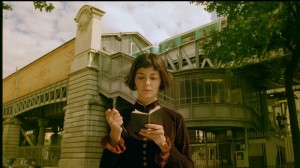Trying to bring a text or an idea to life in a classroom, several times a day, five days a week can be a challenge as every teacher and pupil knows. Sometimes, even the best strategies become tired. A few exceptions to this appear to be drama, music, art and a great story which more often than not, engage most pupils most of the time. Not surprising then that a well chosen film, which employs all of these art forms, almost always produces a positive response in a young audience.
Which is why the education charity Filmclub has launched its Power of Film campaign, to promote learning through film and highlight the immense capacity film has to engage, inspire, educate and unite young people. Special screenings at schools throughout the UK will be followed by discussions about the power of film, and new educational resources will be offered to schools including free, downloadable film guides and 19 subject-linked, curriculum support film seasons.
Film is the most democratic and accessible of art forms, one that offers a century of stories from all over the world told in hundreds of languages and using music, art and drama – yet its use in education has to date been very limited.
Filmclub allows teachers to set up and run free film clubs. Now operating in 7,000 UK schools, the initiative sees the impact film has on tens of thousands of children each week – 93% of participating teachers say it engages pupils who do not take part in other activities, 88% say it broadens children’s cultural horizons, 80% say it boosts their critical skills and 81% say it improves receptivity to learning. Over 5,000 reviews are posted on the Filmclub website each week – half of them by boys and many, teachers tell us, from children who have never before written voluntarily. Feedback also reveals film can be a powerful tool to promote debate about complex issues, from bullying to racism to war to sexuality.
Not only does a school film club offer an opportunity to augment the curriculum, great cinema is an emotional and intellectual journey in its own right: from alienation to empathy (The Visitor, ET: The Extra-Terrestrial, La Belle et La Bête), from apathy to outrage (Hotel Rwanda, To Kill a Mockingbird, Milk), or simply from a bad mood to a better one (Singin’ in the Rain, Blazing Saddles, Duck Soup). Like any trip worth taking, Filmclub offers the potential to see breath taking sights, make new friends, and develop not only an understanding of lives very different from your own, but also a deep empathy for the people living them.
Film can take young people one step at a time to happiness and well-being (Way Out West); anti-bullying (A Room for Romeo Brass); green issues (An Inconvenient Truth); the Victorians (Oliver Twist); an awareness of sexism (Thelma and Louise); promoting reading (Animal Farm); teenage pregnancy (A Way of Life); protest and rebellion (If); girls with attitude (Spirited Away); fascism and dictatorship (The Great Dictator); love (Slumdog Millionaire); conspiracy and uncertainty (The 39 Steps).
For many children and young people, developing a knowledge of film is the beginning of a life-long passion. Or as Godard says in Bande à Part, ‘Let the images speak.’
For information about FILMCLUB and Power of Film visit www.filmclub.org
IMAGES: A still from Amélie, and, right, Sabrina Broadbent, head of schools at Filmclub




